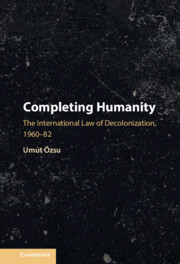‘In this study of the many initiatives of Third World states commencing in the 1960s, Özsu provides a vivid account of the personalities involved, the projects they inaugurated, and the battles fought over the meaning and direction of international law. What emerges is a masterly history of the ‘international law of decolonization', a rich and valuable addition to the literature on a topic that is finally receiving the attention it deserves.'
Tony Anghie - National University of Singapore
‘In this history of the Third World's bid to transform international law, Özsu illustrates why the law was such an important arena for political struggle, tracks the expansive visions of an international legal order pioneered by lawyers from the global South, and makes clear how the struggles of the past remain with us in the present. Written with clarity and precision, Completing Humanity is an important contribution to the growing scholarship on decolonization.'
Adom Getachew - University of Chicago
‘In his stunning and unprecedented book, Umut Özsu describes the ambition and breadth of the decolonizing agenda — and why international law mattered so much to it – while probing the impasses, limits, and resistance that foiled it. An accessible and dramatic story, Completing Humanity is based on exemplary learning and overflowing with insight and provocation: the most significant and sophisticated contribution to the history of international law written in many years.'
Samuel Moyn - Yale University
‘This is a gripping new take on the relationship between the historical process of decolonization and international law. Özsu focuses on five key debates in international law which hold at their heart the struggle between those who seek to move beyond the tragic legacies of empire, and those who benefit from those legacies. The book offers a sustained engagement with a panoply of eminent and courageous jurists from the South, their allies, interlocutors, and rivals. The thoughtful alignment between orientation, method, and structure is a model for scholars of all stripes.'
Sundhya Pahuja - University of Melbourne
'This book kaleidoscopically charts the Third World's efforts to craft a post-colonial international law during the long 1970s … Özsu eloquently reconstructs the ideological scenery where North-South tensions unfolded.'
Soheil Ghasemi
Source: Asian Journal of International Law
‘The book is very well-researched, conceptualized, organized, and crafted … it makes an original and immense contribution to international law.’
Obiora Chinedu Okafor - The American Journal of International Law



